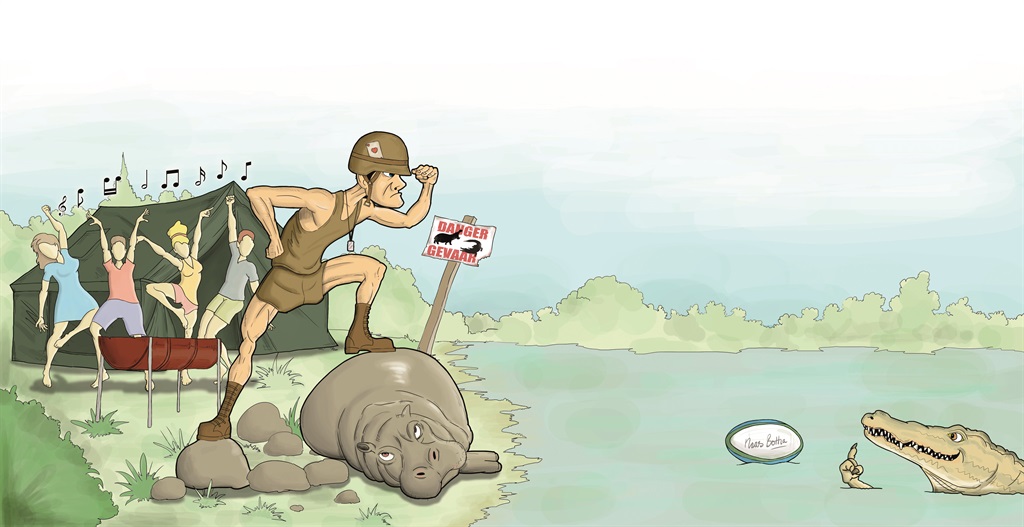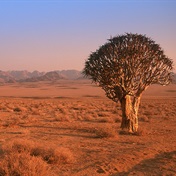
Young people do stupid stuff – the fact that he still has all 10 of his fingers and toes cannot be attributed to his own sound judgement, says Zigi Ekron.
By the end of the previous millennium, I found myself in Mbombela. It was still called Nelspruit back then and was home to, among others, the Dangerous Darkies, who were then still playing in the national soccer league.
It was also the headquarters of Eastern Transvaal Command where I was doing my national service. There were only a handful of army bases inside our national borders that were farther from my childhood home in the Boland – the same applies to the area’s fauna and flora.
Where I grew up, the only ‘wildlife’ we’d come across in our daily lives was possibly a squirrel on the main street or a dassie on a mountain footpath. Being on the Kruger National Park’s doorstep was therefore an unprecedented adventure for me.
Plus, we weren’t stuck in a dull camp with bad food and watchtowers. We often had dealings with the area’s fruit farmers and they gave us fresh bananas, litchis, oranges, nuts and the like. They also offered that we could stay on their farms when we had to do field work.
That’s how three colleagues and I came to spend the night in a canvas tent next to a banana plantation on a farm next to the Komati River. When I unzipped the tent at daylight with my towel draped casually over my shoulder, the wiser and older one of the three roused himself enough to ask: “And where do you think you’re going?”
“To the river, to wash,” I answered.
“You know there are crocodiles in the river, right? Watch your step,” he grumbled before stretching out in his sleeping bag and continuing to snore. I washed my face with water from a jug and lit a coffee fire.
A few months later, some friends and I took advantage of another farmer’s invitation to spend a weekend with our girlfriends on his farm’s private campsite – right next to the very same river.
We didn’t exactly have camping equipment and convinced a guy in charge of supplies to lend us a big old army tent in exchange for a few packs of cigarettes and a promise to introduce him to someone’s sister. It was one of those big green things with more poles and ropes than you’d see at a Voortrekker rally, with a single centre pole keeping it all upright.
At the campsite, farmer Nico showed us where to set up camp and casually mentioned that we should keep our eyes open for crocodiles. Nico, a keen tigerfish angler, had made the front page of the local newspaper a week or so before after an altercation with one of these creatures.
He’d been fishing on a weir with a friend when the croc grabbed his friend by the lower leg and dragged him into the water. Every time the crocodile turned to drown its prey, Nico pelted its soft stomach with stones until it let go. The friend survived, but lost his leg.
After that, Nico installed a couple of traps. He showed us the nearest one, less than 100 m downstream from the campsite.
But it was the hippos that had our full attention: a group of five or six of them in the middle of the river. Four big ones surrounded the little ones and each lay down with its nose in a different wind direction to keep an eye on us. There was no fence or barrier between us and them, but it felt that we had an instinctive agreement: if we all left each other alone, the weekend would go smoothly.
With some effort, we pitched the tent on the open spot Nico cleared between the thickets on the river bank, and at dusk we laughed and talked around the fire crackling in the braai drum.
It was pitch dark when we went to bed. And that’s when the hippos decided we’d occupied their pasture long enough. We were barely in the tent when we heard the soft “grrrrts... grrrts” of them chomping the soft green grass of the campsite.
We could only manage some light sleep, especially Thalita, the girlfriend of Hannes. Around midnight, her nerves couldn’t take it anymore. “Honey,” she whispered to Hannes.
“Honey, move up a little. I don’t want to be this close to the door. What if the hippo comes in here and steps on us.”
Hannes’ logical but thoughtless response was that hippos are not known for understanding the concept of a door. If they decided to invite themselves inside the tent, they wouldn’t first look for a possible opening.
By sunrise, the hippos were back in the water and we continued having fun. We started playing touchies, until I accidentally kicked the ball into the water. At first it hovered just out of our reach on the water and we tried to rake it closer with a long branch, but no go.
Our efforts had the opposite effect and the ball drifted another metre or two away. I estimated the water to be knee deep where it was; waist deep at the most.
A long time ago, I read somewhere that hippos can reach a speed of about 8 km/h in the water, but up to 30 km/h on land. With our “neighbours” around 200 m upstream, I therefore had roughly a minute to jump into the water and save Pottie’s rugby ball.
“Hold on to my flip flops; I’m going to get the ball,” I declared, as though I was about to rescue someone’s chihuahua from the depths of a burning building.
“Have you lost your mind?” Hannes exclaimed. I explained my calculations about the hippos, but I didn’t convince anyone, not even Pottie. “What about the crocodiles?” he asked.
“Oh come on, what crocodiles? Maybe you see crocodiles?! I don’t see a single crocodile,” I snapped back.
For a moment, everyone was silent, as if I’d spoken a great truth – until Pottie ended the conversation and scuppered my plan with an unexpected literary reference: “Yeah, Mabalel also didn’t see the crocodile.”
There we stood on the banks of the Komati River and watched as Pottie’s Super Springbok rugby ball floated towards Maputo.
It was as though everyone’s enthusiasm for camping had drifted away with that ball, and that night around the campfire, it wasn’t quite as merry as the previous night.
We packed up slowly the next day, it was too hot to move quickly, until a shrill scream rang through the air. Thalita had been downstream and came jogging back to the campsite, her eyes as big as saucers.
We wanted to know out what scared her but she couldn’t speak. “Did you spot another lizard?” teased Hannes.
“Come look, come look,” was all she managed to get out. And there it was, where Nico had set his trap for the crocodile. Our very own Lalele – all 390 kg. A whole 3,5 m from snout to his tail (according to the man from Nature Conservation who came to collect it).
The cage was in tatters, but it hadn’t been able to free itself. Thalita, one of the gentlest, most decent people I’ve ever come across, quietly turned around. Looking Hannes straight in the eye, she gestured to the crocodile. “Honey,” she said. “That… that, that isn’t… that’s not a bloody lizard!”
I didn’t say anything. I simply bought Pottie a new rugby ball on Monday.



 Publications
Publications
 Partners
Partners




